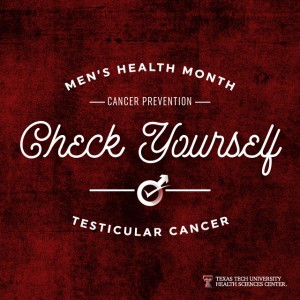Cancer Prevention: Check Yourself

Man Up, Check Yourself
If you are like most guys, you have heard of testicular cancer, but don’t know too much about it. Some men don’t like to talk about the topic, maybe because they think it is too embarrassing. If that is the case, it is time to man up and learn the facts.
Alan Haynes, M.D., Texas Tech Physicians — Urology, said the thought of losing a testicle
can be unbearable for some men, but it beats the alternative.
“Men need to take the same approach as women do with breast cancer and be proactive
about their health,” Haynes said. “The survival rate for men with early-stage seminoma
or the least aggressive type of testicular cancer is greater than 95 percent.”
What age does Testicular cancer target men?
Testicular cancer is the most common cancer in males 15 to 35 years old. This disease targets younger men who may think they are invincible. Men need to take charge of their health.
What is the survival rate for testicular cancer?
The good news is that testicular cancer is one of the most treatable and survivable types of cancer. Even in late stages, odds of survival are quite high. Yet, treatment may be tougher and more painful to get through and there are possibilities the cancer may spread to other organs.
What are the symptoms?
Men should see a doctor if they notice any of the following symptoms:
• a painless lump or swelling in a testicle
• pain or discomfort in a testicle or in the scrotum
• any enlargement of a testicle or change in the way it feels
• a feeling of heaviness in the scrotum
• a dull ache in the lower abdomen, back or groin
What can men do?
Men, the key is to do self-exams on a regular basis. Once a month, examine the size, shape and texture of your testicles. Notice when something is different.
Related Stories
Celebrating Veterans: TTUHSC’s General Martin Clay’s Legacy of Service and Leadership
From his initial enlistment in the Army National Guard 36 years ago to his leadership in military and civilian health care management roles, Major General Martin Clay’s career has been shaped by adaptability, mission focus and service to others.
Texas Tech University Health Sciences Center School of Nursing Named Best Accelerated Bachelor of Science in Nursing Program in Texas
The TTUHSC School of Nursing Accelerated Bachelor of Science in Nursing (BSN) program has been ranked the No. 1 accelerated nursing program in Texas by RegisteredNursing.org.
TTUHSC Names New Regional Dean for the School of Nursing
Louise Rice, DNP, RN, has been named regional dean of the TTUHSC School of Nursing on the Amarillo campus.
Recent Stories
National Academy of Inventors Names TTUHSC Faculty Senior Members
The National Academy of Inventors (NAI) has designated two current and one former TTUHSC faculty researchers as Senior Members.
The John Wayne Cancer Foundation Surgical Oncology Fellowship Program at Texas Tech University Health Sciences Center Announced
TTUHSC is collaborating with the John Wayne Cancer Foundation and has established the Big Cure Endowment, which supports the university’s efforts to reduce cancer incidence and increase survivability of people in rural and underserved areas.
TTUHSC Receives $1 Million Gift from Amarillo National Bank to Expand and Enhance Pediatric Care in the Panhandle
TTUHSC School of Medicine leaders accepted a $1 million philanthropic gift from Amarillo National Bank on Tuesday (Feb. 10), marking a transformational investment in pediatric care for the Texas Panhandle.
